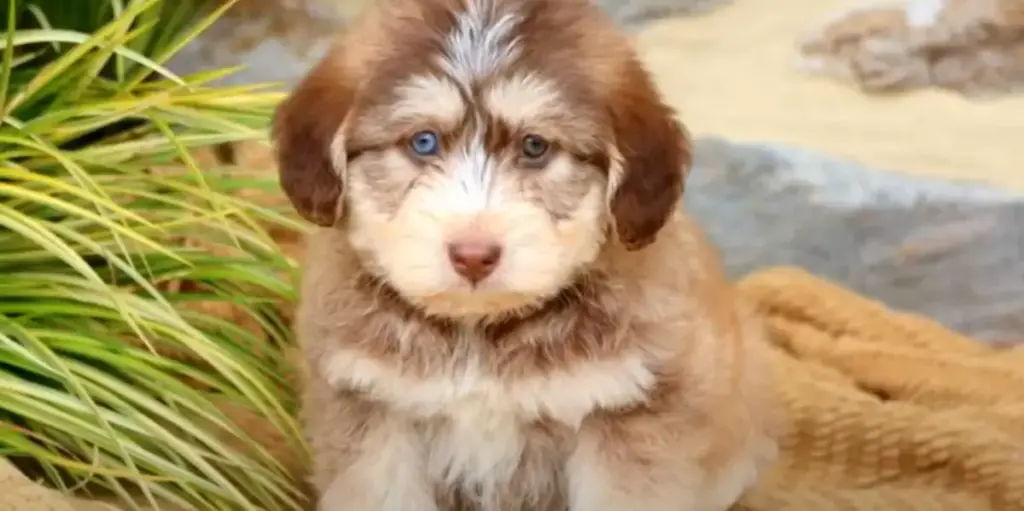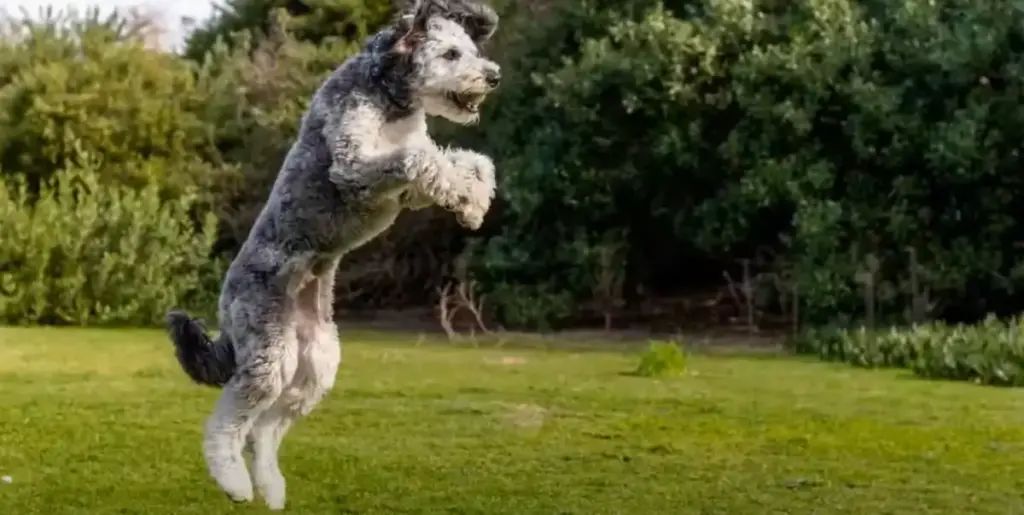Imagine navigating the personality of a Huskydoodle as you would a complex yet captivating maze; each turn reveals a unique blend of traits that can lead to a delightful surprise or a challenging obstacle.
You’ve likely heard about the famed intelligence of Poodles and the boundless energy of Siberian Huskies. Now, picture the combination: a Huskydoodle, an enchanting hybrid that demands your understanding and respect.
As an experienced professional, you know that this mix breed isn’t just a simple pet choice; it’s a commitment to comprehend and appreciate the fusion of two very distinctive canine worlds. Their affectionate nature and penchant for humor are as much a part of them as their potential for stubbornness when under-stimulated.
Caring for a Huskydoodle means tuning into their specific needs and quirks—something you’re capable of. But are you prepared for the challenges and rewards of welcoming such a dynamic companion?
Let’s explore the intricacies of the Huskydoodle’s temperament and care requirements to uncover if this captivating mix fits you.
- Noise Level
- Energy
- Sociability
- Trainability
- Care
- Health
Overall
Summary
The Huskydoodle is rated as having moderate noise levels and sociability, high energy, trainability, and health, and requires moderate care.
Huskydoodle: Traits, Temperament, and Care Guide
While Huskydoodles, a dynamic crossbreed of Siberian Husky and Poodle, boast a friendly and intelligent temperament, they require consistent grooming and exercise to maintain their well-being. As a mixed breed, they inherit traits from both parent breeds, meaning they’re medium to large with high energy levels that necessitate ample exercise and mental stimulation.
You’re looking at a breed that requires regular grooming—brushing at least twice weekly and monthly baths—to keep their double coat in top condition.
These intelligent dogs flourish with obedience training and socialization from a young age, helping to curb their strong prey drive. They’re generally good with kids, making them a beloved addition to the family. However, they’re prone to certain health issues, so staying informed and proactive is crucial.
Exploring the Characteristics of the Huskydoodle
Delving into the characteristics of the Huskydoodle reveals a breed that’s not only affectionate and humorous but also requires a dedicated owner to manage their potential for strong-willed behavior. As a hybrid breed of the Siberian Husky and Poodle, the Huskydoodle inherits intelligence and a playful spirit, making them a joy to have around. However, their high energy levels mean they thrive on regular exercise and mental stimulation to prevent boredom-related issues.
| Aspect | Description | Consideration |
|---|---|---|
| Coat | Double, hypoallergenic, regular grooming needed | May be odorless |
| Exercise Needs | High, to prevent destructive behavior | Requires dedicated time |
| Health Issues | Relatively healthy, can live past a decade | Regular check-ups advised |
| Training | Intelligent and trainable, but can be strong-willed | Patience and experience needed |
Huskydoodle: A Comprehensive Profile and Guide
You’ve learned about the unique mix known as the Huskydoodle, combining traits from the Siberian Husky and Poodle. Now, you’ll get a comprehensive profile and guide to understand everything this breed offers, from temperament to care requirements.
Everything You Need to Know
The Huskydoodle, a crossbreed of the energetic Siberian Husky and the intelligent Poodle, demands comprehensive understanding to ensure its well-being and happiness. As a Husky Poodle Mix owner, you’re embracing a designer dog that inherits traits from both parent breeds. Here’s what you should know:
- Health & Maintenance
- Regular grooming to prevent matting in their double coat
- Awareness of health problems prevalent in both Huskies and Poodles
- Lifestyle & Training
- Exercise to stay fit is crucial, matching their active lifestyle
- Early socialization is key to a well-adjusted, friendly Huskypoo puppy
- Choosing Your Dog
- Opt for adoption or reputable breeders to find your hybrid dog companion
- Avoid impulsive decisions; understand the commitment involved
Your Huskydoodle thrives with an owner who values an active, engaged life alongside their furry family member.
Discovering the Temperament
Understanding a Huskydoodle’s temperament is key, as their mix of affection and potential for stubbornness requires knowledgeable handling for a harmonious companionship. These highly energetic dogs thrive on regular exercise and mental stimulation, integral to maintaining their well-being. Without it, they may become aggressive and destructive, especially if bored or frustrated. As an owner, you must be prepared for their spirited energy and sometimes strong-willed nature.
Early socialization and training are critical, ensuring your Huskydoodle can become good with young children and respond well to training, avoiding behavioral issues. Be mindful that, like all breeds, they’re prone to certain health issues. Your commitment to their care and attention will contribute significantly to a healthy, happy, and well-adjusted companion.

Huskydoodle: Is It a Good Fit for Families?
You may wonder if a Huskydoodle fits well with your family dynamic. With their friendly disposition and intelligence, these dogs are often a joy for children who can match their energy levels. However, you’ll need to consider their potential for aggressive behavior when not properly stimulated and the commitment to regular grooming and exercise.
It’s important to note that Huskydoodles can be highly energetic and require plenty of exercise to keep them happy and healthy. They have a strong prey drive and may chase small animals, so keeping them on a leash or in a securely fenced area when outdoors is crucial. Additionally, Huskydoodles have a thick, double coat that requires regular brushing to prevent matting and shedding. Grooming sessions can be time-consuming, so be prepared to invest in regular grooming or learn how to do it yourself.
Regarding aggression, Huskydoodles can display protective behaviors toward their family and territory. Early socialization and training ensure they don’t become overly protective or aggressive. Positive reinforcement techniques and consistent training can help mold them into well-behaved and balanced dogs.
If you’re an active family that enjoys spending time outdoors and can commit to regular exercise and grooming, a Huskydoodle can be a wonderful addition to your household. However, if you cannot meet their physical and mental needs, it’s best to consider a different breed that better aligns with your lifestyle.
Assessing Huskydoodle’s Compatibility with Families and Kids
Considering a Huskydoodle as your next family pet requires evaluating their high energy and affectionate nature to ensure they align with your household’s lifestyle and space. Here’s what you need to know:
- Energy and Exercise
- Require daily exercise to stay healthy and happy
- Great option for active families who enjoy spending time outdoors
- Family Dynamics
- Generally good with young children, offering affectionate and funny companionship
- Adult supervision is advised to ensure safe interactions
- Home Environment
- Need space to roam; not well-suited for apartment living
- Respond well to training but don’t like being left alone for long periods
Huskydoodles can be a good match for families looking for an energetic, loving pet that thrives on human connection and activity.
Huskydoodle Climate Flexibility
Huskydoodles exhibit notable climate flexibility, adapting well to various environments, particularly thriving in cooler conditions. Your Husky Poodle Mix inherits a double coat from the Siberian Huskies side, providing insulation against the cold. However, they may struggle in extreme heat; you’ll need to ensure they’ve shade, cooling options, and plenty of water during warmer months.
The unique coat that requires regular grooming to prevent matting must be brushed at least twice weekly. This maintains the health of their curly coat, passed down from the Poodle parent, and helps regulate body temperature.
While they’re not prone to joint problems, staying active in a climate suitable for their energy levels is key to their overall well-being.
Huskydoodle Obedience Techniques
Consistent, reward-based training strategies are crucial when teaching your Huskydoodle obedience. Their intelligence means they learn quickly, but their independent streak can sometimes be challenging.
It’s important to start training early and use clear, consistent commands to ensure the best results.
Effective Training Strategies
To effectively train a Huskydoodle, use positive reinforcement techniques such as offering treats and verbal praise to encourage and reward good behavior. Establishing yourself as a leader with consistent rules makes training less difficult, even for a stubborn breed. A Huskydoodle needs regular mental and physical stimulation; plan for hours of exercise every day to keep your dog engaged and happy.
Owners should know that the best dog training strategies are tailored to their pet’s unique personality. Here’s a quick guide:
| Strategy | Description |
|---|---|
| Positive Reinforcement | Use treats and praise to motivate. |
| Consistent Leadership | Set firm boundaries to guide behavior. |
| Mental Stimulation | Interactive toys to prevent boredom and mischief. |
Exercise and Grooming Needs
Ensuring your Huskydoodle gets at least an hour of exercise daily is crucial for its well-being. It helps prevent undesirable behaviors and promotes robust physical health. Your Husky Poodle Mix thrives on activities like walks, runs, and playtime, while mental stimulation from interactive toys and puzzles keeps it sharp and engaged.
When it comes to exercise and grooming needs, consistent care is key. Brushing at least twice weekly with a wire brush will prevent matting and remove loose hair, especially since huskies shed. This regular grooming maintains a healthy skin and coat and distributes natural oils, which are essential for your furry friend’s well-being.

Health Considerations
As you consider a Huskydoodle, be aware they can inherit health issues common to their parent breeds, such as hip dysplasia and eye problems.
Ensuring they receive proper nutrition, exercise, and preventive health measures can help maximize their years of companionship.
Common Health Issues and Lifespan
Huskydoodle owners should be aware that while these dogs typically enjoy a lifespan of 12 to 15 years, they may be prone to several health issues. Common health concerns include allergies, hip dysplasia, progressive retinal atrophy, and sensitive stomachs. Choosing the best puppy and high-quality dog foods is vital to maintain their overall health and manage any predispositions.
Ensuring that your Huskydoodle receives proper care through regular vet check-ups is crucial in keeping these strong prey drive canines thriving. Early socialization and training and a balanced diet can mitigate the risk of physical and behavioral conditions. This will reinforce the bond you share with your loyal companion.
Is Huskydoodle the Right Dog for You?
Considering a Huskydoodle as your next pet requires understanding that this high-energy, intelligent mix demands an experienced owner who can provide ample exercise and mental stimulation. The Husky Poodle Mix, a designer breed, is known for a temperament that can become destructive when frustrated. You’ll need a home with a yard where your Huskydoodle can expend its energy. This dog breed thrives on engagement and will require regular, rigorous exercise to meet its exercise needs.
Moreover, you should be prepared for the grooming responsibilities that come with the double coat and potential health issues inherited from both parent breeds. If you’re seeking a loyal, active companion and have the time to invest in training and care, the Huskydoodle could be an excellent match for your lifestyle.
Conclusion
In the whirlwind world of dog breeds, the huskydoodle is a marvel of canine engineering! Boasting a brain that rivals Einstein’s and the stamina of a marathon runner, this pooch is a living, barking testament to what happens when you cross wizard-like intelligence with boundless energy.
If you’re ready for a life filled with adventure, laughter, and fur-flying fun, then this hypoallergic, odorless wonder might just be your four-legged soulmate!
